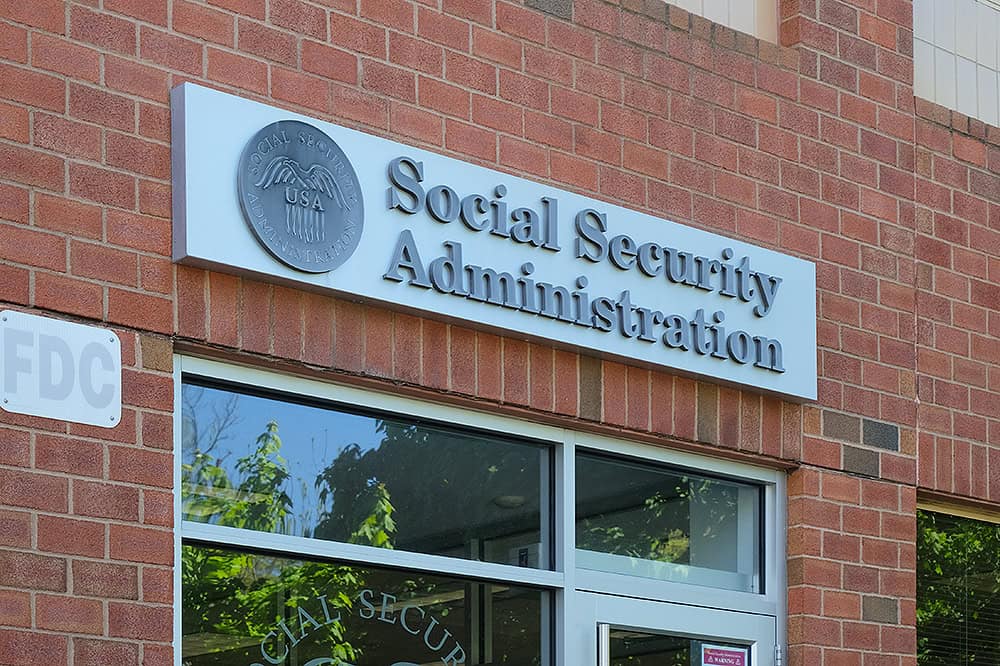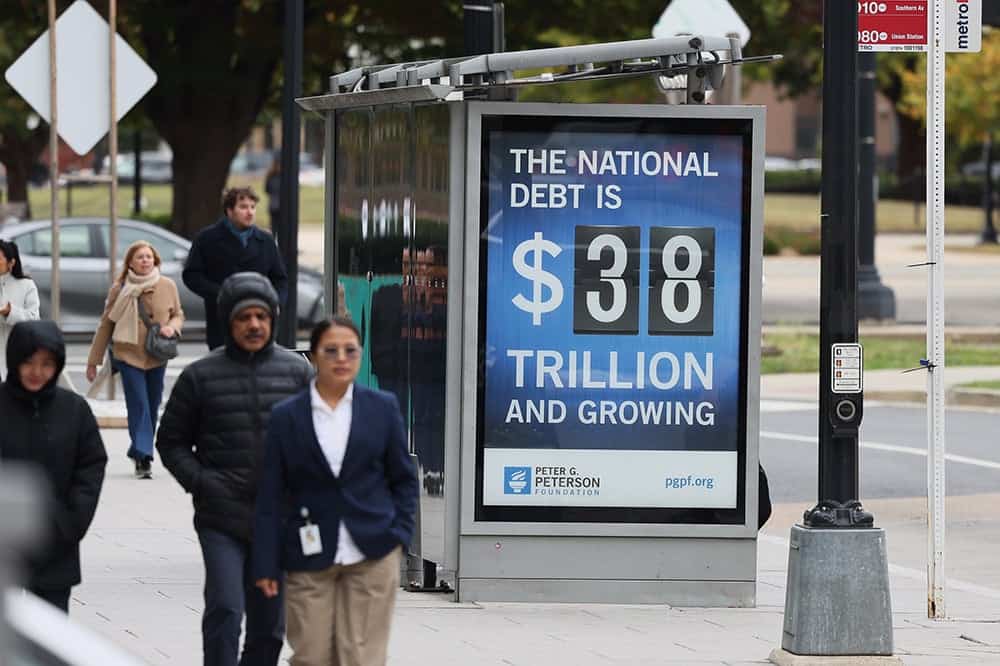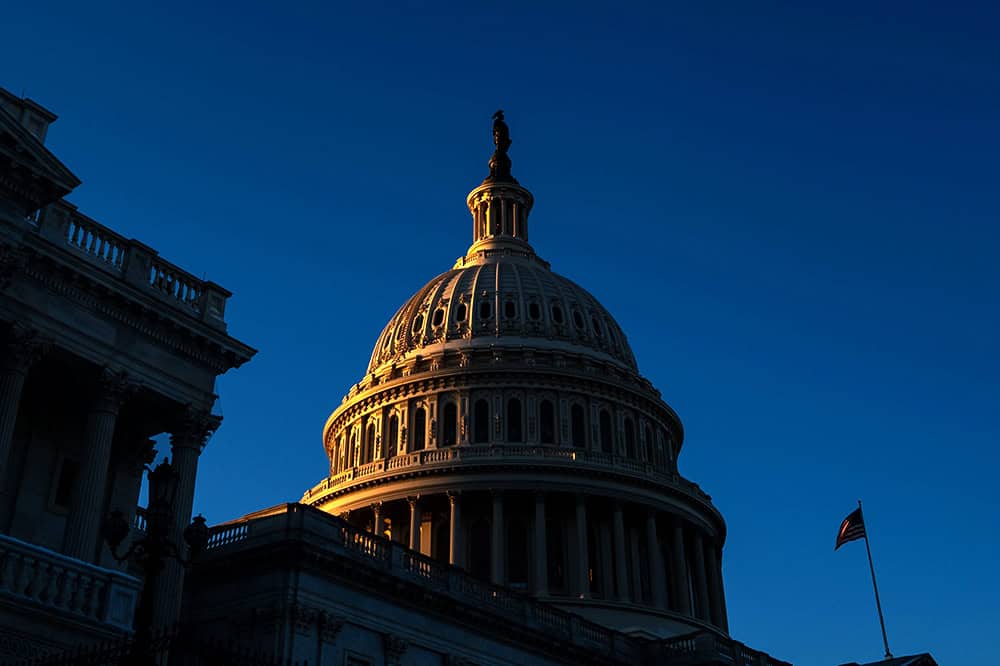U.S. Fiscal Confidence Climbs from Record Low upon Passage of Inflation Reduction Act
The August 2022 Fiscal Confidence Index, Modeled after the Consumer Confidence Index, is 44 (100 is Neutral)
NEW YORK (August 23, 2022) — U.S. Fiscal Confidence jumped from an all-time low upon the passage of the Inflation Reduction Act of 2022, which is projected to reduce deficits by more than $300 billion over the next 10 years and potentially provide greater savings after that. The Peter G. Peterson Foundation’s Fiscal Confidence Index is 44 (100 is neutral), with a 15-point improvement in the Expectations subcategory, reflecting voters’ strong approval and desire for policymakers to continue lowering deficits and paying for their priorities.
Voters are more likely to believe the national debt problem will improve over the next few years (30% better/63% worse, up from 22%/73%). Optimism for progress on the debt is up as well (42% optimistic/53% pessimistic, up from 36%/60%), exemplifying the positive impact the Inflation Reduction Act has created in the minds of voters – particularly Democrats. The Concern subcategory also improved this month as more voters believe America is getting the national debt back on track (33% right track/65% wrong track, up from 24%/73%).
Despite this impressive movement, Americans also understand that there is still much reform needed to reach fiscal sustainability. Across party lines, the vast majority of voters believe more work needs to be done to address the unsustainable national debt and budget outlook. Eight-in-10 voters (81%) urge the president and Congress to spend more time addressing the debt, and 75% feel the national debt should be a top-three priority for the president and Congress, including 69% of Democrats, 71% of independents and 84% of Republicans.
“This month’s improvement in the index makes it clear that voters want leaders who will improve America’s fiscal and economic future,” said Michael A. Peterson, CEO of the Peterson Foundation. “Despite the recognition of the progress in the recent Inflation Reduction Act, today’s survey shows that voters across party lines are not satisfied with our current fiscal outlook, with $16 trillion in new debt coming on over the next decade. They understand that inflation is leading to increased interest costs, which will now total a staggering $8 trillion over the next ten years. They are urging policymakers to continue addressing the unsustainable budget outlook to ensure greater resources, economic strength and opportunity for our collective future.”
The Fiscal Confidence Index measures public opinion about the national debt by asking six questions in three key areas:
- CONCERN: Level of concern and views about the direction of the national debt.
- PRIORITY: How high a priority addressing the debt should be for elected leaders.
- EXPECTATIONS: Expectations about whether the debt situation will get better or worse in the next few years.
The survey results from these three areas are weighted equally and averaged to produce the Fiscal Confidence Index value. The Fiscal Confidence Index, like the Consumer Confidence Index, is indexed on a scale of 0 to 200, with a neutral midpoint of 100. A reading above 100 indicates positive sentiment. A reading below 100 indicates negative sentiment.
Fiscal Confidence Index Key Data Points:
- The August 2022 Fiscal Confidence Index value is 44. (The July value was 37. The June value was 39.)
- The current Fiscal Confidence Index score for CONCERN about the debt is 37, indicating deep concern about the debt. The score for debt as a PRIORITY that leaders must address is 28, indicating that Americans want elected leaders to make addressing long-term debt a high priority. The score for EXPECTATIONS about progress on the debt is 68, an all-time low. The Fiscal Confidence Index is the average of these three sub-category scores.
- For a description of the complete methodology, see the Appendix below.
The Peter G. Peterson Foundation commissioned this poll by the Global Strategy Group and North Star Opinion Research to survey public opinion on the national debt. The online poll included 1,000 registered voters nationwide, surveyed between August 15, 2022 and August 17, 2022. The poll has a margin of error of +/- 3.1%. The poll examined voters’ opinions on the national debt, political leadership, and America’s fiscal and economic health.
Detailed poll results can be found online at: www.pgpf.org/FiscalConfidenceIndex.
About the Peter G. Peterson Foundation
The Peter G. Peterson Foundation is a nonprofit, nonpartisan organization that is dedicated to increasing public awareness of the nature and urgency of key fiscal challenges threatening America’s future, and to accelerating action on them. To address these challenges successfully, we work to bring Americans together to find and implement sensible, long-term solutions that transcend age, party lines and ideological divides in order to achieve real results. To learn more, please visit www.pgpf.org.
APPENDIX: Fiscal Confidence Index Methodology and Questions
- The Fiscal Confidence Index is released monthly by the Peter G. Peterson Foundation.
- The Fiscal Confidence Index value is based on six questions in three categories.
- As is done with the Consumer Confidence Index, the first step in calculating the Fiscal Confidence Index is determining the “Relative Value” for each question. This calculation is made by taking the positive response for each question and dividing it by the sum of the positive and negative responses. Each question was asked on a four-point scale, and answers were weighted according to intensity, with the strongest responses counting twice as much as the middle responses (“much” better or worse answers count twice as heavily as “somewhat” better or worse answers).
- The scores for the Concern, Priority, and Expectations categories are determined by averaging the scores derived from the two questions in each category.
- The Fiscal Confidence Index value is converted from the Relative Value to place it on a scale on which 100 indicates equal positive and negative sentiment, while values below 100 indicate negative sentiment and values above 100 indicate positive sentiment.
- The questions are as follows:
| CONCERN (37) | |||
|---|---|---|---|
| Thinking about our national debt over the last few years, would you say your level of concern has increased or decreased? ◊ Is that a lot or just a little? |
Aug 2022 | July 2022 | June 2022 |
| Increased a lot | 52% | 54% | 54% |
| Increased a little | 28% | 27% | 25% |
| Decreased a little | 6% | 5% | 7% |
| Decreased a lot | 2% | 2% | 3% |
| (No change) | 10% | 10% | 8% |
| (Don’t Know/Refused) | 3% | 2% | 3% |
| INCREASED (NET) | 80% | 81% | 79% |
| DECREASED (NET) | 8% | 7% | 10% |
| When it comes to addressing our national debt, would you say things in the United States are heading in the right direction or do you think things are off on the wrong track? ◊ Do you feel that way strongly or just somewhat? |
Aug 2022 | July 2022 | June 2022 |
| Right direction — Strongly | 11% | 8% | 10% |
| Right direction — Somewhat | 22% | 16% | 19% |
| Wrong track — Somewhat | 24% | 27% | 24% |
| Wrong track — Strongly | 40% | 46% | 44% |
| (Neither/Mixed) | * | * | 1% |
| (Don’t Know/Refused) | 2% | 3% | 3% |
| RIGHT DIRECTION (NET) | 33% | 24% | 29% |
| WRONG TRACK (NET) | 65% | 73% | 67% |
| PRIORITY (28) | |||
|---|---|---|---|
| Some people say that addressing the national debt should be among the president and Congress’ top 3 priorities. Do you agree or disagree? ◊ Do you feel that way strongly or just somewhat? |
Aug 2022 | July 2022 | June 2022 |
| Strongly agree | 48% | 49% | 51% |
| Somewhat agree | 26% | 24% | 24% |
| Somewhat disagree | 16% | 16% | 14% |
| Strongly disagree | 5% | 6% | 6% |
| (Don’t Know/Refused) | 4% | 5% | 6% |
| AGREE (NET) | 75% | 73% | 75% |
| DISAGREE (NET) | 21% | 22% | 20% |
| And when it comes to our national debt, do you think it is an issue that the president and Congress should spend more time addressing or less time addressing? ◊ Would you say a lot (more or less) time or just a little? |
Aug 2022 | July 2022 | June 2022 |
| A lot more time | 47% | 50% | 49% |
| A little more time | 34% | 29% | 29% |
| A little less time | 8% | 8% | 7% |
| A lot less time | 3% | 5% | 6% |
| (The same amount of time) | 4% | 4% | 4% |
| (Don’t Know/Refused) | 4% | 4% | 5% |
| MORE TIME (NET) | 81% | 79% | 78% |
| LESS TIME (NET) | 11% | 13% | 12% |
| EXPECTATIONS (68) | |||
|---|---|---|---|
| And thinking about our national debt over the next few years, do you expect the problem to get better or worse? ◊ Is that much (better or worse) or just somewhat (better or worse)? |
Aug 2022 | July 2022 | June 2022 |
| Much better | 7% | 6% | 8% |
| Somewhat better | 23% | 16% | 14% |
| Somewhat worse | 29% | 32% | 32% |
| Much worse | 34% | 41% | 41% |
| (No change) | 3% | 2% | 2% |
| (Don’t know/Refused) | 4% | 3% | 4% |
| BETTER (NET) | 30% | 22% | 22% |
| WORSE (NET) | 63% | 73% | 73% |
| And when it comes to our national debt, are you optimistic or pessimistic that the United States will be able to make progress on our national debt over the next few years? ◊ Would you say you are very (optimistic or pessimistic) or just somewhat? |
Aug 2022 | July 2022 | June 2022 |
| Very optimistic | 8% | 6% | 6% |
| Somewhat optimistic | 34% | 30% | 30% |
| Somewhat pessimistic | 33% | 36% | 33% |
| Very pessimistic | 19% | 23% | 26% |
| (Neither/Mixed) | 2% | 2% | 2% |
| (Don’t Know/Refused) | 3% | 2% | 4% |
| OPTIMISTIC (NET) | 42% | 36% | 35% |
| PESSIMISTIC (NET) | 53% | 60% | 59% |
Further Reading
Lawmakers are Running Out of Time to Fix Social Security
Without reform, Social Security could be depleted as early as 2032, with automatic cuts for beneficiaries.
What Is the National Debt Costing Us?
Programs that millions of Americans depend on and care about may be feeling a squeeze from interest costs on our high and rising national debt.
Interest Costs on the National Debt Are Reaching All-Time Highs
The most recent CBO projections confirm once again that America’s fiscal outlook is on an unsustainable path — increasingly driven by higher interest costs.


